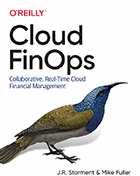FinOps model eases cloud billing complexities
Cloud cost management is a top priority on admin's minds. FinOps expert Mike Fuller talks about cloud billing challenges and how to overcome them in this Q&A.
FinOps is a growing strategy that businesses use to optimize their cloud spending. Within this practice, teams come together to manage their financial budgets. Cost management and cloud billing are a large, challenging aspect of FinOps that every team must overcome.
Co-author of Cloud FinOps: Collaborative, Real-Time Cloud Financial Management Mike Fuller acknowledges the difficulty that cloud billing brings to the table but believes that the tools and knowledge gained from the FinOps model can help organizations in the long run.
In this Q&A, Fuller discusses facets of cloud billing, including challenges of cloud billing and how to overcome them.
Editor's note: The following interview was edited for length and clarity.
What are components of cloud billing people tend to overlook?
Mike Fuller: The big thing is the granularity of cloud billing. The traditional finance person isn't familiar with a detailed bill line that can come in the hundreds or millions or billions of lines per month. If you think of a traditional data center, all the individual components are bundled up into a big server, but cloud charges you for all those little components. In order to understand what a cost driver is within that bill, you end up having to understand how each of these components starts to come together and how they work together. Trying to dig into the cloud bill and understand that is way more complex than people first imagine.
What is a common mistake teams tend to make with cloud billing, and how would you suggest they avoid this?
Fuller: One of the big drivers for us to get this content down on paper was to try and prevent people falling into the same pitfalls that others have fallen into over the last few years. I think that the story is starting to become less common now, and the main thing is that companies move to the cloud too quickly. Cloud transformation -- and the cost of cloud -- still seems to be a secondary consideration. This falls under the umbrella of thinking that the cloud is cheaper, which it can be. But, done incorrectly, it can be quite expensive. I think that this sort of problem has changed into how businesses transition into the cloud, their preparedness for their use of cloud and the management of costs.
Have there been any changes to the billing process since your book has been published?
Fuller: New services or new features come out all the time, so there will be added data that goes into those bills. Since the book, there hasn't been any major changes to the current billing data that's there. But, over the last 12 years, especially with Amazon being one of the first clouds with original builds, there has been quite a lot of change. We did try as much as possible to avoid being very specific to things that will change because we knew that the cloud is a fast-moving target to hit.
How can teams apply the Establish, Enhance, Excel method to their billing process?
Editor's note: The Establish, Enhance, Excel method was previously named the Crawl, Walk, Run method and has recently undergone a name change.
Fuller: I would love to be able to write a book that, once you finish reading, you're an expert, and everybody can just do cloud FinOps without any sort of extra effort. Because there is a lot of cultural change and a lot to process, the change has to happen inside the business. The reason we have the maturity model is to try and say you shouldn't just start sprinting right at the beginning. You're going to end up eventually tripping over all of those problems along the way. If you do it relatively slowly but with a haste, you will be able to build that knowledge on the right capabilities as you're growing in order to solve the problems as they come up for your business. It is about making sure that you're pouring all your effort into the right areas of the capability set in order to get the business the most impact.
Do you think cloud providers do a good job making bills clear for customers? Are some providers clearer than others?
Fuller: Some providers will provide you way more granularity. Amazon has been doing this longer than most of the other clouds, and so their bill is very granular. It comes as a drawback that you end up with a very detailed bill.
I think all the cloud providers could do better in giving out clearer data dictionaries for the billing data they give out. Helping their users connect to their summarized bill, and you get at your accounts receivable all the way down to the individual element. All cloud providers should continue to build that granularity but make sure that it's paired with a data dictionary. This would make it easier for the billing expert to figure out.








